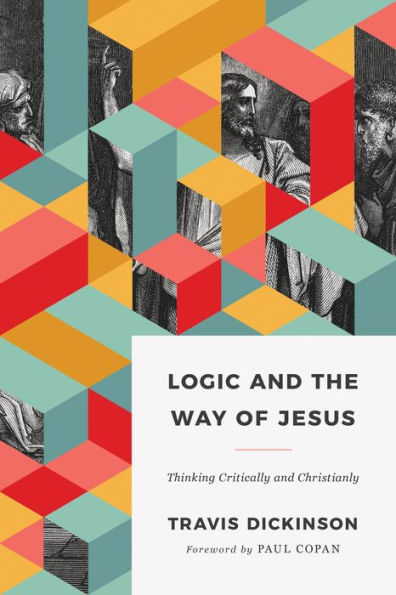
Editor’s note: This post originally appeared on Think Apologetics. Tabernacle of David considers this resource trustworthy and Biblically sound.
.
Logic and the Way of Jesus: Thinking Critically and Christianly, by Travis Dickinson, 367 pp. B&H Academic, 2022.

Travis Dickison is professor of philosophy at Dallas Baptist University. In Logic and the Way of Jesus: Thinking Critically and Christianly, Dickinson wants Christians to use their minds to the glory of God. There have been other books written on this topic such as J.P. Moreland’s Love Your God with All Your Mind: The Role of Reason in the Life of the Soul and James Sire’s Habits of the Mind: Intellectual Life as a Christian Calling. Dickinson reiterates some of Moreland’s points about anti-intellectualism in the church. God has certainly given us emotions to be used for his glory. But sometimes emotions aren’t always good indicators of truth. Just as we can be drawn to the emotional appeal of Christianity, we can be drawn to another community with similar emotional appeal perhaps without realizing we have made a change (pg.5).
As Dickinson notes, Christianity is not merely a set of beliefs, nor just a religion. It is a worldview in the fullest sense of the term. Thus, it is a way of life (pg. 12). Dickinson wants us to think “Christianly” about everything. Thus, we need to end the compartmentalization. Education, career, recreation, and every facet of life should be seen as submission to the Lordship of Christ (pg. 13). Dickinson notes that engaging culture isn’t the only reason for intellectual pursuits. Since we are created in the image of God, we are created to be intellectual. As Aristotle notes, “All men by nature desire to know.” Human beings are mentally restless (pg. 13-14). Dickinson’s chapter on Critical Thinking and Worldview reiterates some of the worldview definitions and questions as discussed in David Naugel’s Worldview: The History of a Concept, Steve Wilkens and Mark Sanford’s Hidden Worldviews: Eight Cultural Stories That Shape Our Lives and Sire’s Universe Next Door. Dickinson says a worldview should be logically consistent, as well as be able to make sense of the world (it has adequate explanatory power) as well as being livable (pgs. 70-71).
I found the chapter The Argument from Reason to be very helpful. He notes that since atheists tend to revere logic and reason, their worldview should be able to give an account for the use of logic and reason. Where do the laws of logic come from? Logical principles are not contingent, in that they go in and out of existence. They are “necessary” in that they have always been there, and they can’t fail to not exist. They don’t pass out of existence. Dickinson says that on a naturalistic account of the world, there is nothing in this worldview to make sense of logic and a mind- independent reality (pg. 90). Of course, C.S. Lewis and Alvin Plantinga has discussed this issue in greater length. He also notes Platonists can affirm logical principles, but only as brute abstract objects, and this seems hopelessly ad hoc (pg. 94).
Dickinson has several chapters on logic (i.e., deductive standards for logic, truth tables, categorical logic, non-deductive standards for logic, fallacies). So if you are new to learning the basics of logic, these chapters are good staring points. I appreciated the two chapters on “Science and Inference to the Best Explanation” and “Evidence.” It’s no secret that Intelligent design as well as historical and scientific arguments rely on the abductive method. The abductive method is a form of non-deductive reasoning that looks for the best explanation in terms of possessing theoretical virtues over alternative explanations. “Theoretical vices” which makes one theory less likely to be true, and, the case of clear logical inconsistency, makes a theory false. Dickinson explains each vice in detail which consists of internal consistency, explanatory power, simplicity, conservatism, and independent verification (pgs.226-230).
As far as when we evaluate evidence, our background knowledge will always play a role. Background knowledge is similar to a worldview in that we all have intellectual commitments that inform our evaluation of the evidence (pg. 246). People may say they are neutral observers, but the evidence seems to show the opposite. Dickinson rightly says “Evidence matters. Without it, we lack intellectual assurance for our beliefs. A belief can of course be true without having evidence. We could just guess that Christianity is true, and then we would have a true belief. But if we have no evidence, then we truly believe by accident. We would have no intellectual assurance Christianity is true” (pg. 248).
In the end, there are consequences for not thinking Christianly. Seeing people naturalistically makes it more challenging to hold to a high moral view of human beings. If humans do not bear the divine image, their worth can only be determined on the basis of their differing abilities and empirical qualities. Humans could not have “unalienable rights,” as the Declaration of Independence states, if they have no objective value simply by being human. Also, if we hold to a postmodern view of truth, many things (i.e., gender, sexuality, etc) can just be seen as a social construct. The list goes on.
If you are interested in flexing your intellectual muscles and you desire to love God with all your being (including your mind), this is a great resource. I highly recommend it.

